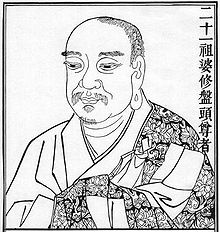വസുബന്ധു
വസുബന്ധു (Vasubandhu) | |
|---|---|
 | |
| തൊഴിൽ | Buddhist monk |
| അറിയപ്പെടുന്നത് | Cofounder of the Yogacara philosophical school. |
ഗാന്ധാരദേശക്കാരനായിരുന്ന ഒരു ബുദ്ധമതപണ്ഡിതനായിരുന്നു വസുബന്ധു(Vasubandhu Sanskrit; Traditional Chinese: 世親; pinyin: Shìqīn; വൈൽ: dbyig gnyen) (fl. 4- 5 ശതകം). ബൌദ്ധധർമസംഹിതകൾ ഉൾക്കൊള്ളിച്ച് അഭിധർമകോശം രചിച്ചു. മഹായാന ബുദ്ധമതവിശ്വാസിയായതിനുശേഷം തന്റെ അർദ്ധസഹോദരനായിരുന്ന അസംഗാചാര്യനുമൊപ്പം യോഗകാരം സ്ഥാപിച്ച പ്രമുഖരായവരിൽ ഒരാളാണ് അദ്ദേഹം. ടിബെറ്റൻ, പൂർവ്വേഷ്യൻ ബുദ്ധമതക്കാർ അഭിധർമ്മത്തെക്കുറിച്ച് പഠനം നടത്താൻ ഉപയോഗിക്കുന്ന അഭിധർമ്മകോശസംഹിത രചിച്ചത് വസുബന്ധുവാണ്.[1] [2]ഇന്ത്യൻ ബുദ്ധമത തത്ത്വചിന്തകരിൽ അദ്ദേഹത്തിന് പ്രമുഖസ്ഥാനമുണ്ട്.
Life and works
[തിരുത്തുക]ഇന്നത്ത് പാകിസ്താനിൽ ഉൾപ്പെടുന്ന പെഷവാറിലാണ് അദ്ദേഹം ജനിച്ചത്. [3] . ചന്ദ്രഗുപ്തന്റെയും, പിതാവ് സമുദ്രഗുപ്തന്റെയും സമകാലികനായിരുന്നു.[4] എ.ഡി 499-569 ജീവിച്ചിരുന്ന പരമാർഥ (Paramärtha) ആണ് വസുബന്ധുവിന്റെ ജീവചരിത്രം ആദ്യമായി ചൈനീസ് ഭാഷയിലേക്ക് വിവർത്തനം ചെയ്തതെന്ന് കരുതപ്പെടുന്നു.[5] അന്ന് ഗാന്ധാരത്തിൽ പ്രചരിച്ചിരുന്ന സർവ്വാസ്ഥിവാദമാണ് അദ്ദേഹം ആദ്യം അഭ്യസിച്ചത്. സർവ്വാസ്തിവാദത്തെക്കുറിച്ച് കൂടുതൽ അറിയാൻ അദ്ദേഹം കാശ്മീരിലേക്ക് പോയി[6] തിരിച്ച് വന്നതിനു ശേഷം സർവ്വാസ്തിവാദ അഭിധർമം ക്രോഡീകരിച്ച് അഭിധർമകോശകാരിക (Abhidharmakośakārikā Verses on the Treasury of the Abhidharma) രചിച്ചു.[2]
പിന്നീട് സഹോദരനായ അസംഗാചാര്യന്റെ പ്രേരണയാൽ മഹായാന ബുദ്ധമത വിശ്വാസിയായി. താഴെപ്പറയുന്നവ അദ്ദേഹത്തിന്റെ കൃതികളിൽ ചിലതാണ്
- പഞ്ചസ്കന്ധപ്രകാരണ (Pañcaskandhaprakaraṇa Explanation of the Five Aggregates)
- കർമസിധിപ്രകരണ (Karmasiddhiprakarana "A Treatise on Karma")
- വ്യാഖ്യയുക്തി(Vyākhyāyukti "Proper Mode of Exposition")
- വാദവിധി(Vādavidhi "Rules for Debate")
- മഹായാന സതാധർമ പ്രകാശമുക്ത ശാസ്ത്ര (Mahāyāna śatadharmā-prakāśamukha śāstra )
- അമിതായുസ് സൂത്രൂപദേശ(Amitayus sutropadeśa "Instruction on the Amitabha Sutra")
- വിജ്ഞാപ്തിമത്രത ശാസ്ത്ര (Vijnaptimatrata Sastra "Treatise on representation only")
- മഹായാനസംഗ്രഹഭാഷ്യ(Mahāyānasaṃgrahabhāṣya Commentary to the Summary of the Great Vehicle of Asanga)
- ധർമ്മാധർമ്മതവിഭാഗവൃത്തി(Dharmadharma tāvibhāgavṛtti Commentary on Distinguishing Elements from Reality)
- മധ്യാന്തവിഭാഗഭാഷ്യ(Madhyāntavibhāgabhāṣya Commentary on Distinguishing the Middle from the Extremes)
- മഹായാനസൂത്രാലംകാരഭാഷ്യ(Mahāyānasūtrālaṃkārabhāṣya Commentary on the Ornament to the Great Vehicle Discourses)
- ദശാഭൂമികാഭാഷ്യ(Dasabhūmikabhāsya Commentary on the Ten Stages Sutra)
അവലംബം
[തിരുത്തുക]- ↑ Lusthaus, Dan, 2002. Buddhist Phenomenology: A Philosophical Investigation of Yogācāra Philosophy and the Ch’eng Wei-shih lun, New York, NY: RoutledgeCurzon.
- ↑ 2.0 2.1 Gold, Jonathan C., "Vasubandhu", The Stanford Encyclopedia of Philosophy (Summer 2015 Edition), Edward N. Zalta (ed.), URL = <http://plato.stanford.edu/archives/sum2015/entries/vasubandhu/>.
- ↑ Anacker, Stefan; Seven Works of Vasubandhu, the Buddhist Psychological Doctor, page 13.
- ↑ Dharma Fellowship (2005). Yogacara Theory - Part One: Background History. Source: [1] Archived 2018-01-20 at the Wayback Machine (Accessed: November 15, 2007)
- ↑ Takakusu, J., trans. (1904). The Life of Vasubandhu by Paramartha, T'oung-pao 5, 269 - 296
- ↑ Lusthaus, Dan; Vasubandhu Archived 2017-10-14 at the Wayback Machine
- Abhidharma Kosha Bhashyam 4 vols, Vasubandhu, translated into English by Leo Pruden (based on Louis de la Vallée Poussin’s French translation), Asian Humanities Press, Berkeley, 1988-90.
- L’Abhidharmakosa de Vasubandhu, traduit et annoté par Louis de la Vallée Poussin, Paul Geuthner, Paris, 1923-1931 vol.1 vol.2 vol.3 vol.4 vol.5 vol.6 Internet Archive (PDF)
- Stefan Anacker, Seven Works of Vasubandhu Motilal Banarsidass, Delhi, 1984, 1998
- Ernst Steinkellner and Xuezhu Li (eds), Vasubandhu's Pañcaskandhaka (Wien, Verlag der Österreichischen Akademie der Wissenschaften, 2008) (Sanskrit Texts from the Tibetan Autonomous Region, 4).
- Dharmamitra, trans.; Vasubandhu's Treatise on the Bodhisattva Vow, Kalavinka Press 2009, ISBN 978-1-935413-09-7
- David J. Kalupahana, The Principles of Buddhist Psychology, State University of New York Press, Albany, 1987, pp 173–192.
- Francis H. Cook, Three Texts on Consciousness Only, Numata Center for Buddhist Translation and Research, Berkeley, 1999, pp 371–383 ("Thirty Verses on Consciousness Only") and pp 385–408 ("Twenty Verses on Consciousness Only")
- Erich Frauwallner, The Philosophy of Buddhism, Motilal Banarsidass, Delhi, 2010.
- Li Rongxi, Albert A. Dalia (2002). The Lives of Great Monks and Nuns, Berkeley CA: Numata Center for Translation and Research
- Thich Nhat Hanh Transformation at the Base (subtitle) Fifty Verses on the Nature of Consciousness, Parallax Press, Berkeley, 2001; inspired in part by Vasubandhu and his Twenty Verses and Thirty Verses texts
- Kochumuttom, Thomas (1982). A Buddhist Doctrine of Experience: A New Translation and Interpretation of the Works of Vasubandhu the Yogacarin. Delhi: Motilal Banarsidass
പുറത്തേക്കുള്ള കണ്ണികൾ
[തിരുത്തുക]
- Vasubandhu: Entry at the Internet Encyclopedia of Philosophy
- Multilingual edition of Triṃśikāvijñapti in the Bibliotheca Polyglotta
- Vasubandhu’s Treatise on the Three Natures (Trisvabhāvanirdeśa) – A Translation and Commentary by Jay Garfield
| ഹൈന്ദവ തത്ത്വചിന്ത | സാംഖ്യ | ന്യായം | വൈശേഷികം | യോഗം | മീമാംസ | അദ്വൈത വേദാന്തം | വിശിഷ്ടാദ്വൈതം | ദ്വൈതം | ചാർവാകം | | |
| ജൈന തത്ത്വചിന്ത | അനേകാന്ദവാദം | |
| ബുദ്ധ തത്ത്വചിന്ത | ശ്യൂനത | മദ്ധ്യമകം | യോഗകാരം | സ്വാതന്ത്രികം | | |
| തത്വചിന്തകർ | ഗൗതമൻ | പതഞ്ജലി | യാജ്ഞവല്ക്യൻ | കണാദൻ | കപിലൻ | ജൈമിനി | വ്യാസൻ | നാഗാർജ്ജുനൻ | മാധാവാചാര്യൻ | കുമാര ജീവൻ | പത്മ സംഭവൻ | വസുബന്ധു | ആദി ശങ്കരൻ| രാമനുജൻ| കാർത്യായനൻ | More... | |
| ഗ്രന്ഥങ്ങൾ | യോഗ സൂത്രം | ന്യായ സൂത്രങ്ങൾ | വൈശേഷിക സൂത്രങ്ങൾ | സംഖ്യ സൂത്രം | മീമാംസ സൂത്രം | ബ്രഹ്മസൂത്രം | മൂലാദ്ധ്യയകകരിക | More... |
